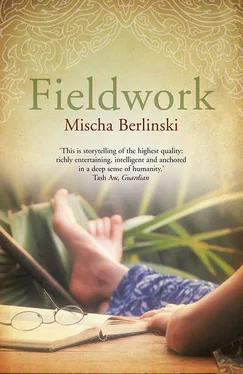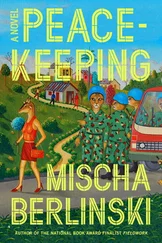Although the institution of the dyal had no parallel in Martiya's personal experience, she was aware that similar practices were to be found in other parts of the world. In Martiya's small library of books, she had a paperback abridged edition of James Frazier's The Golden Bough , where, in a chapter titled "The Influence of the Sexes on Vegetation," Martiya read about similar rites. The Pipile of Central America "kept apart from their wives ‘in order that on the night before planting they might indulge their passions to the fullest extent; certain persons are even said to have been appointed to perform the sexual act at the very moment when the first seeds were deposited in the ground.' " Similarly, "in some parts of Java, at the season when the bloom will soon be on the rice, the husbandman and his wife visit their fields by night and there engage in sexual intercourse for the purpose of promoting the growth of the crop." Analagous rites could be found also in Leti, Sarmata, in the Babar Islands, in Amboyna, and among the Baganda of Central Africa — and even in Europe, where Frazier notes the custom, found in Ukraine and Germany, of asking married couples to lie down and roll over the newly sown fields "to promote the fertility of the crops."
It was one thing to read about such things in Frazier; another thing entirely to see them with her own eyes. What piqued Martiya's curiosity most intensely was the total reluctance on the part of the villagers of Dan Loi to discuss any aspect of the dyal with an outsider. One by one, Martiya had delicately asked questions of her favorite informants throughout the village; but even the old women who would gladly chatter for hours with Martiya about every other facet of village life, from childbearing to inheritance law to intimate secrets of the Dyalo bedroom, shied away when asked to discuss the dyal .
The more Martiya studied the dyal , the greater the importance of understanding the custom seemed to her. It was a counterexample to some of the most important rules of Dyalo life: it was the only time in which the normally strict rules governing associations and the segregations of clans were relaxed. Partners in the dyal came from every and any clan, and were mixed up in no easily discernible way. The rice harvest was one of the only rituals, rites, or festivals in the Dyalo calendar binding far-flung Dyalo villages together. Martiya asked herself: How were the planting partnerships formed? Was the dyal a way of legitimizing and discharging sexual tension within the community of Dyalo villages? Fidelity was generally prized by the Dyalo and adultery commonly considered shameful — did the Dyalo make an exception for the dyal ? In her time in the village, Martiya had already seen several feuds erupt as the result of an adulterous liaison, including one which had led to violence. Did jealousy ever ensue as a result of the dyal ? How did husband and wife greet each other at the end of the dyal ? How and when was the dyal explained to children?
What did the Dyalo think happened when the rice was seeded? Why didn't the opium, the maize, or the gardens require similar rituals? If a woman became pregnant as a result of the dyal , how was the offspring treated? The sexual act at the heart of the dyal —was it ritualized? Was it accompanied by any particular prayers or magic rites?
What was the connection in the Dyalo mind between the dyal and rice planting? Did the Dyalo believe the dyal necessary to the fructification of the rice? Or simply desirable? If necessary, how did they explain the failure of other peoples to perform the same rite?
What was the native's point of view?
Martiya hadn't the faintest clue.
The only answer the Dyalo offered when she asked about the dyal was that this was what it took to keep Rice happy. And if Rice wasn't happy, the Dyalo would be hungry !
TWO. THE MINISTRY OF GHOSTS
KAREN'S TRIP TO THAILANDin the winter of 1983 was just what her sagging soul had needed. Martiya met her at the Chiang Mai airport in a borrowed jeep, then drove her up to Dan Loi on the one-lane red dirt road, Martiya accelerating into the curves, one hand holding the wheel, the other hand tapping Karen's knee, Martiya saying, "Kit-Kat! It's so great to see you!" the old jeep making scary, creaking noises, suggesting to Karen that even if Martiya had wanted to hit the brakes, it wasn't entirely a sure thing that the vehicle would obey. Martiya had the habit of taking her eyes off the road to point out some thatch-roofed village on the far horizon and give commentary: "We're coming up on Moo Bat Yai, it's an Akha village, interesting headman, you've got to meet him, he's got three wives and they are driving him insane, funny thing is — the Akha aren't usually polygamous. Oh! See that hill there?" All the way up to Dan Loi, as the jeep barreled blindly around the curves with clouds of red dust trailing behind, Karen held her breath.
But when they got to the village, the place was just one huge bougainvillea in bloom, that's what it felt like: bougainvillea everywhere, sprouting weedlike from the ditches beside the road, draped like a bright crimson curtain over all the huts. Martiya hadn't mentioned the bougainvillea in her letters, how colorful the village was, and how warm the winter sun. Just being with Martiya and walking through the village with her reminded Karen of the apartment on the north side of campus with the handwriting on the wall.
Martiya had done what everyone else just dreams about: she had dropped off the face of the earth and, despite having fallen so impossibly far, had landed on her feet.
Karen spent most of her first day in Dan Loi thinking about faculty meetings in Madison and that lonely kitchen with the formaldehyde floor, and scraping the ice off of the windshield when she went out to start the car in the morning; then she went with Martiya down to the communal cooking hut, where Martiya laughed with all the village women as she sat down and made dinner over an open fire, chopping garlic, onions, and chili peppers with a huge machete, then stir-frying everything up in a wok. Karen could understand nothing of the language, of course, but it was clear that Martiya was fluent: only someone quite fluent in a foreign language could laugh so unhesitatingly at the jokes. After lunch, Karen and Martiya went back up to Martiya's hut, where they sat outside on the patio in the early evening, drinking one of the bottles of white wine which Karen had bought at the duty-free shop. Martiya pointed out the Hmong village on the far side of the valley and there was nothing, really nothing, so green as the green of the rice fields. Have you seen it? Karen asked me. Then you know.
The sun set, and all evening long as Karen and Martiya talked and talked and talked, the kiss-me birds sang in the trees, whoo-tuk-tuk, whoo-tuk-tuk. Later, as Martiya and Karen sat on the porch smoking a joint the way they used to back in Berkeley every night, fireflies swarmed through the village, an endless trail of flickering green lights swooping and diving through the warm night air. A little yellow moon hung in the sky like a man grinning in his sleep on account of a pleasant dream, and somewhere in the village someone started to sing, a tender baritone singing in that strange language, a song so sad that the whole village grew absolutely still.
"You didn't tell me this place was so amazingly beautiful," Karen said.
Martiya just smiled.
Over their tea the next morning, Martiya and Karen watched the silver mist burn off the valley. It was cold season, although it wasn't cold for someone living in Wisconsin; but Martiya wore a big oversize sweater which made her look little, her arms lost somewhere in the long sleeves, and she tucked her legs underneath her, cuddling herself up into a ball. She was still as pretty as Karen remembered — not beautiful, but definitely striking, with those big eyes and high cheekbones, and the tumbling dark hair offsetting the small features. Against Martiya and the villagers, Karen felt big and slow and swollen, as if she had been inflated in the years since she had left the Philippines. No matter what, she had to get back out into the field.
Читать дальше












